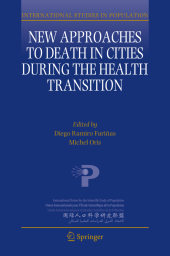 Neuerscheinungen 2018Stand: 2020-02-01 |
Schnellsuche
ISBN/Stichwort/Autor
|
Herderstraße 10
10625 Berlin
Tel.: 030 315 714 16
Fax 030 315 714 14
info@buchspektrum.de |

Michel Oris, Diego Ramiro Fari¤as
(Beteiligte)
New Approaches to Death in Cities during the Health Transition
Herausgegeben von Ramiro Fari¤as, Diego; Oris, Michel
1st ed. 2016. 2018. viii, 241 S. 18 SW-Abb., 22 Farbabb. 235 mm
Verlag/Jahr: SPRINGER, BERLIN; SPRINGER INTERNATIONAL PUBLISHING 2018
ISBN: 3-319-99400-X (331999400X)
Neue ISBN: 978-3-319-99400-0 (9783319994000)
Preis und Lieferzeit: Bitte klicken
This book presents recent efforts and new approaches to improve our understanding of the evolution of health and mortality in urban environments in the long run, looking at transformation and adaptations during the process of rapid population growth. In a world characterized by large and rapidly evolving urban environments, the past and present challenges cities face is one of the key topics in our society. Cities are a world of differences and, consequently, of inequalities. At the same time cities remain, above all, the spaces of interactions among a variety of social groups, the places where poor, middle-class, and wealthy people, as well as elites, have coexisted in harmony or tension. Urban areas also form specific epidemiological environments since they are characterized by population concentration and density, and a high variety of social spaces from wealthy neighborhoods to slums. Inversely and coherently, cities develop answers in terms of sanitary policies and health infrastructures. This balance between risk and protective factors is, however, not at all constant across time and space and is especially endangered in periods of massive demographic growth, particularly periods of urbanization mainly led by immigration flows that transform both the socioeconomic and demographic composition of urban populations and the morphological nature of urban environments. Therefore this book is an unique contribution in which present day and past socio-demographic and health challenges confronted by big urban environments are combined.
New approaches to death in the cities during the health transition. An introduction: Michel Oris, Diego Ramiro Farinas.- Mortality within the city: historical Europe: Understanding infant mortality in the city: exploring registration and compositional effects. Madrid, 1905-1906: Barbara A. Revuelta Eugercios, Diego Ramiro Farinas.- Environment, housing, and infant mortality: Udine, 1807-1815: Alessio Fornasin, Marco Breschi, Matteo Manfredini.- Residential mobility and child mortality in early twentieth century Belfast: Alice Reid, Eilidh Garrett, Simon Szreter.- Micro-analysis of mortality in urban areas. The parish of Oliveira in Guimaraes between the 18th and 20th century: Norberta Amorim, Antero Ferreira, Luis Machado.- Urban mortality in transition: Infant and childhood mortality in a context of transitional fertility. Geneva 1800-1900: Reto Schumacher.- A slow transition. Infant and child mortality decline in a Sardinian community: Alghero (1866-1935): Marco Breschi, Massimo Esposito, Stanislao Mazzoni, Lucia Pozzi.- The democratization of longevity: how the poor became old. Paris, 1870-1940: Lionel Kesztenbaum, Jean-Laurent Rosenthal.- Urban mortality in the developing world: Estimating effects over time of influences on urban health outcomes: a longitudinal multilevel epidemiological investigation: Barthélémy Kuate Defo.- Will urban and rural mortality converge in Africa?: Michel Garenne.- Urban mortality transition: the role of slums: Günther Fink, Isabel Günther, Kenneth Hill.- Health disparities at the periphery of Ouagadougou: Clémentine Rossier, Abdramane Soura, Bruno Lankoande, Roch Millogo.


